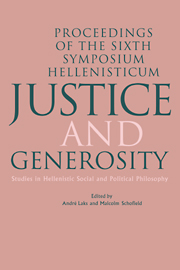 Justice and Generosity
Justice and Generosity Book contents
- Frontmatter
- Contents
- Preface
- Introduction
- PART I POLITICAL PHILOSOPHY: DEVELOPMENT AND TRANSFORMATION
- PART II THE ETHICAL FRAMEWORK OF POLITICS AND SOCIETY
- 6 The Epicurean theory of law and justice
- 7 Two Stoic approaches to justice
- 8 Cicero's politics in De officiis
- 9 Politics and paradox in Seneca's De beneficiis
- Bibliography
- General index
- Index of Greek and Latin words
- Index of ancient names and philosophical schools
- Index of passages
7 - Two Stoic approaches to justice
from PART II - THE ETHICAL FRAMEWORK OF POLITICS AND SOCIETY
Published online by Cambridge University Press: 15 October 2009
- Frontmatter
- Contents
- Preface
- Introduction
- PART I POLITICAL PHILOSOPHY: DEVELOPMENT AND TRANSFORMATION
- PART II THE ETHICAL FRAMEWORK OF POLITICS AND SOCIETY
- 6 The Epicurean theory of law and justice
- 7 Two Stoic approaches to justice
- 8 Cicero's politics in De officiis
- 9 Politics and paradox in Seneca's De beneficiis
- Bibliography
- General index
- Index of Greek and Latin words
- Index of ancient names and philosophical schools
- Index of passages
Summary
THE TWO APPROACHES
In his response (Leg. 1.15) to Atticus' request that he discuss the ius civile — civil law, or (better) the system of justice in the state — Cicero asks whether what is wanted is an enquiry that will be aliquid uberius quam forensis usus desiderat: ‘something more expansive than the practice of the courts calls for’. He has already indicated that the minutiae of the civil law are beneath him; in any case, plenty of other writers have already dealt with the law of gutters and party walls, and with the drafting of contracts and of formulae for the courts. Atticus, and Quintus too, are all agog for a treatment along the lines Marcus proposes. ‘Quite right’, says Cicero (1.16):
For you must accept that in no other kind of debate is it possible to make apparent what has been granted to man by nature, what a wealth of excellent possessions the human mind contains, what gift we were born and brought into the light to cultivate and work out, what it is that binds human beings together, what natural association there is between them. For only when all this has been explained can the source of laws and justice be found.
- Type
- Chapter
- Information
- Justice and GenerosityStudies in Hellenistic Social and Political Philosophy - Proceedings of the Sixth Symposium Hellenisticum, pp. 191 - 212Publisher: Cambridge University PressPrint publication year: 1995
- 38
- Cited by


